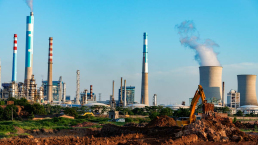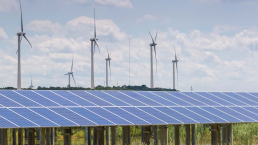The 28th Conference of the Parties to the United Nations Framework Convention on Climate Change was held in the United Arab Emirates from November 30 to December 13, 2023. The COP28 was the largest in its 28-year history, with over 85,000 attendees, and for the first time, an agreement explicitly stating the need to reduce fossil fuels, the main culprit of the climate crisis, was drawn. The Loss and Damages Fund was officially launched, which allows developed countries to provide financial compensation to developing countries suffering from climate crises.
The UNFCCC is one of the three major UN conventions along with the Convention on Biological Diversity [UNCBD] and the Convention to Combat Desertification [UNCCD]. Since it was issued through United Nations Conference on Environment and Development [UNCED] hosted in Brazil, 1992, specific implementation plans of the UNFCCC are discussed annually through COP from 1995.

Major Content of the Final Agreement
In order to achieve net zero by 2050, the COP28 final agreement was adopted, stating as follows: “It is necessary to start the transition away from fossil fuel in the energy system in a fair, orderly and equitable manner by 2030.”
COP28 President Dr. Sultan Al Jaber said, “We have language on fossil fuel in the (COP) final agreement for the first time ever.”
UN Climate Change Executive Secretary Simon Stiell said, “Whilst we didn’t turn the page on the fossil fuel era in Dubai, this outcome is the beginning of the end. Now all governments and businesses need to turn these pledges into real-economy outcomes, without delay.”
Numerous efforts have been made to reduce global greenhouse gas emissions through the COP which was carried out for twenty eight times, but the final agreement on the need to reduce fossil fuels has rarely been agreed upon though the fossil fuel was recognized as the main cause of the climate change.

At COP26, it was agreed to phase-down unabated coal power and phase-out inefficient fossil fuel subsidies, marking the first agreement to mention fossil fuels. However, oil and gas were not included in the agreement, leading to criticism that the initial goal of eliminating fossil fuels had been scaled back.
At COP28, the biggest issue was whether or not the phrase, “phase-out of fossil fuels,” would be included in the agreement. In the agreement, the phrase was replaced by “transition away” due to strong opposition from oil-producing countries such as Saudi Arabia. Some say that the agreement is meaningful because the world made a collective movement to stop relying on fossil fuels. However, considering warnings from the scientific community that greenhouse gases produced by mining and using fossil fuels are major contributors of climate change, there are also strong criticisms that the agreement falls short.

The General Assembly also reaffirmed the importance of implementing carbon neutrality in 2050 to achieve the goal of limiting global warming to 1.5 degrees through the Global Standard Technology [GST], which was carried out for the first time since the adoption of the Paris Agreement in 2015. Although it acknowledged the need to reduce greenhouse gas emissions by 43%, compared to 2019 levels by 2030, it turned out that the climate action of the Parties was too slow.
As part of the plan to achieve the goals of the Paris Agreement, measures include transition away from fossil fuels, tripling global renewable energy capacity and doubling energy efficiency by 2030, and accelerating low-carbon technologies such as nuclear energy and Carbon Capture, Utilization, and Storage [CCUS]. However, there was no clear goal for expanding renewable energy production, and it was pointed out that there was a lack of determination to phase out coal-fired power generation.[1] [2]

What Was the Result of COP28?
- Agreement on the Launch of the Loss and Damages Fund[3]
The Loss and Damages Fund was officially launched on November 30, 2023, which allows developed countries advanced through industrialization to provide financial compensation to developing countries suffering from climate disasters. At first, it was expected that the discussion would intensify until the final minutes of the General Assembly. However, it was evaluated that the outcome was unexpectedly positive, as the launch was announced dramatically on the first day of the event.
The fund has been discussed since the 1990s to acknowledge the responsibility of developed countries for climate disasters and to support developing countries, but it was not easy to reach an agreement due to the lukewarm attitude of the developed countries. At COP27 held in Sharm El Sheikh, Egypt, in November 2022, a comprehensive agreement was reached for the first time. However, the process of deciding on details such as the fund size, management organization, and contribution ratio was fraught with challenges and ongoing negotiations.
According to the draft agreement on the Loss and Damages Fund, the fund will be launched as a UN agency. The size of the fund was disclosed at the launching of the fund. The U.A.E. and Germany, which are the chair countries of the COP28, contributed 100 million USD each, the U.K. 75 million USD, and the U.S. and Japan 17.5 million USD and 10 million USD each. However, due to different opinions between developed and developing countries, the fund was launched without agreement on its donors, scope, and responsibilities. Forecasts suggest that numerous challenges lie ahead for the fund to effectively assist developing countries with their losses and damages.

- Signing the Pledges on Renewable Energy and Energy Efficiency
The Commitment on Renewable Energy and Energy Efficiency, led by the U.A.E., is one of the major achievements of COP28. 123 countries have agreed to triple the renewable energy generation capacity and more than double the energy efficiency by 2030. In particular, they have decided to reduce methane emissions, the second-largest emitted greenhouse gas after carbon dioxide, by 80% or more by 2030. However, China, the largest emitter of greenhouse gases, along with India, the third-largest emitter, and Saudi Arabia and Russia, major exporters of oil and natural gas, did not sign the pledge.[4] [5]
In addition, 22 countries around the world, including the U.S., France, the U.K., the U.A.E., Sweden, etc. recognized nuclear energy as clean energy to solve climate change, and adopted the NetZero Nuclear Initiative which aims to triple nuclear energy capacity by 2050 compared to 2020.[6]
RELATED POSTS
[Global Issue] Ending Plastic Pollution
2024-10-30
[Global Issue] Great Green Wall
2024-09-27
[Global Issue] RED LIST
2024-08-30









